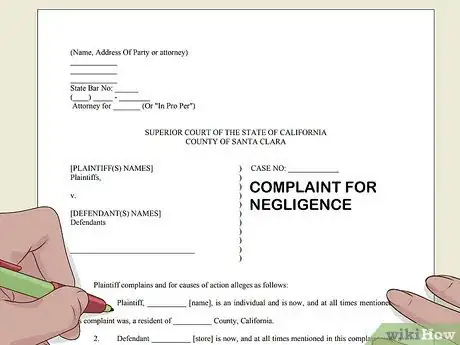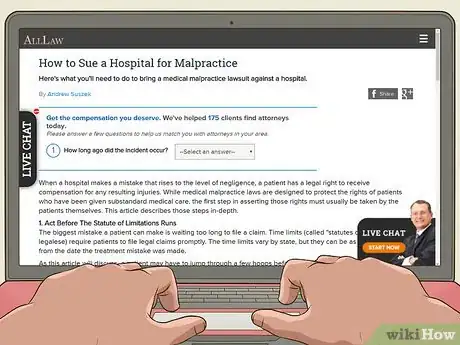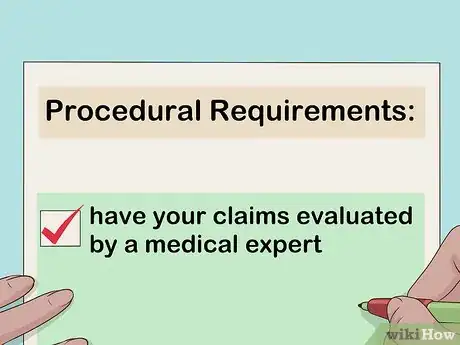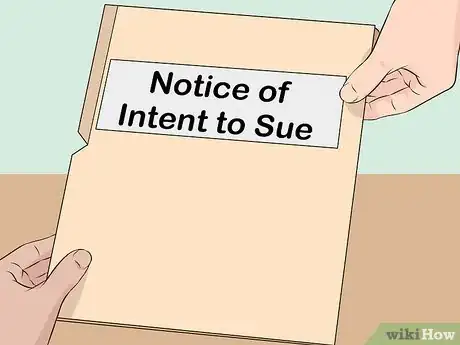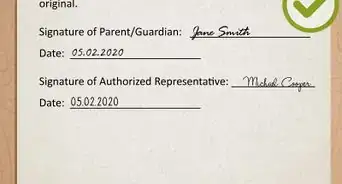This article was written by Jennifer Mueller, JD. Jennifer Mueller is an in-house legal expert at wikiHow. Jennifer reviews, fact-checks, and evaluates wikiHow's legal content to ensure thoroughness and accuracy. She received her JD from Indiana University Maurer School of Law in 2006.
This article has been viewed 33,364 times.
Going to the hospital is seldom a pleasant experience. Sometimes you may leave the hospital in worse condition than you entered. When that happens, you may be able to sue the hospital. You can sue a hospital for injuries you suffered under two basic legal theories: negligence and medical malpractice (which is really a specialized form of negligence). If a loved one died in the hospital as a result of negligence, you also may have the option of suing the hospital for wrongful death. In all of these cases, hiring an attorney is practically essential to a successful resolution of your claim.[1]
Steps
Suing for Negligence
-
1Determine the source of your injury. If you were injured or suffered complications as a result of your stay and treatment in a hospital, you may be able to sue the hospital for negligence. To figure out if the hospital is potentially liable, though, you need to find out why the injury or complication occurred.[2]
- The hospital itself may be negligent for issues related to the condition of the hospital itself that served to exacerbate your medical condition. For example, the hospital would be directly liable if the bed you were laying in broke, causing you to fall on the floor and break your arm.
-
2Identify the people responsible for your injury. The hospital may be vicariously liable for negligent actions on the part of its employees. This includes non-medical hospital staff, technicians, and nurses – although it typically doesn't include doctors.[3]
- For example, suppose a nurse inadvertently gives you the wrong medication. If it's something you're allergic to, or something that interacts badly with another medication you're on, the hospital may be liable for their negligence.
- Non-medical staff also may be negligent. For example, if a janitor fails to clean up a spill in the hallway and you slip and fall, the hospital would likely be liable.
Advertisement -
3Check your state's statute of limitations. All states have a statute of limitations that gives you a limited period of time to fall a lawsuit when you are injured as the result of someone else's negligence.[4]
- If you're suing a hospital, you may have a shorter period of time than you would if you were suing some other individual or company, particularly if your lawsuit deals with medical treatment rather than simple maintenance of facilities. In some states you may have as little as a year after the injury occurs.
- You can typically find out your state's deadline by doing a search online for "statute of limitations" with the name of your state. You can also call the public law library (located at the courthouse) or the clerk's office of your local court.
-
4Consult an attorney. If you sue a hospital, the hospital will defend itself with an entire team of attorneys. If you want your lawsuit to be successful and get the most money for your claim, it will help to have a lawyer on your side.[5]
- Look for a personal injury attorney who has experience filing (and hopefully winning) lawsuits similar to yours. Since most personal injury attorneys work on contingency, don't let money be a concern. The attorney will only get paid if you win your lawsuit or accept a settlement.
-
5File a complaint. Once you find an attorney to represent you, they'll investigate your claim and attempt to get as much information as possible. They also may pursue settlement with the hospital. If that effort isn't successful, they'll file a complaint with your local state court.[6]
- The complaint contains allegations against the hospital and includes your claim for damages, typically monetary damages. Your attorney will get information from you to help you decide how much money you should demand.
- Don't be surprised if the hospital responds with a motion to dismiss. It doesn't necessarily mean your claim doesn't have any merit. If it didn't, the attorney likely would not have agreed to represent you.
-
6Attempt to mediate your claim. If your claim survives a motion to dismiss, the hospital may be more interested in settling your claim than they previously were. To settle the case, the hospital will offer you a sum of money in exchange for dropping your lawsuit and not going to trial.[7]
- At this point, the attorneys can negotiate or you can use a mediation service to attempt to resolve your claim.
- Your attorney will advise you regarding whether you should accept any settlement offered by the hospital, but the decision to settle ultimately is your own.
- Even though a settlement offer may be substantially less than what you've demanded in your complaint, keep in mind you could be mired in litigation for a year or more, and the outcome at trial is uncertain.
-
7Participate in the discovery process. As long as you haven't settled the case, you'll move into the next phase of litigation. Discovery is an intense and at times intrusive process, but you also will gain valuable information that will help your attorney focus your claim.[8]
- As the plaintiff and victim of the alleged negligence, except to give at least one deposition. At a deposition, the hospital's attorneys will interview you on the record and ask you questions related to your claim and your medical condition. These interviews can be extremely stressful, and may get confrontational.
- Your attorney also will request all your medical records and conduct depositions of doctors, nurses, and other hospital staff. You typically will be expected to attend these depositions, even though you usually won't have to participate.
Suing for Malpractice
-
1Find out how long you have to sue. All states have statutes of limitations that provide deadlines for how long you have to sue, but most states have shorter deadlines for medical malpractice lawsuits, regardless of whether you're suing the doctor or the hospital.[9]
- Especially if you were dealing with a significant recovery, get friends or family to help you in the early stages. The statute of limitations may expire before you are physically or mentally able to handle the rigors of litigation.
- Search online for "statute of limitations" with the name of your state to find the right deadline. Make sure you're looking at the deadline for medical malpractice, which may be shorter than the deadline for a regular negligence or personal injury lawsuit. The clerk's office of your local courthouse or the law librarian at a public law library also may be able to help you.
-
2Gather your medical records, reports, and bills. You already have access to much of the evidence that will be used in a medical malpractice case, as well [10]
- Your bills will be essential in determining the amount of damages the hospital owes you as a result of the malpractice.
- Your medical records can reveal errors made by medical professionals that pave the way to a successful malpractice claim. When you hire an attorney, they'll request all these documents from the hospital, but you can get a leg up by gathering everything you have now.
-
3Determine if the doctor or nurse is an employee of the hospital. If your injury is the result of negligence on the part of a doctor or nurse, you won't be able to sue the hospital for negligence unless the doctor or nurse is classified as an employee of the hospital.[11]
- A medical malpractice lawsuit against a hospital acts on the theory of vicarious liability. Essentially, you're holding the hospital liable for the acts of its employees, and alleging that the acts of those employees violated the appropriate standard of care for the medical profession.
- For this theory to hold, you must prove that the individual responsible for your injuries was an employee of the hospital. Since most doctors are considered independent contractors and not employees of the hospital, this can be a difficult theory if you're blaming your injury on a doctor's action (or failure to act).
-
4Consult an attorney. If you've decided you potentially want to sue the hospital for malpractice, a good medical malpractice attorney will be essential to your success.[12]
- Medical malpractice attorneys typically offer a free initial consultation, so try to talk to several before you make your final decision. Choose an attorney who makes you feel comfortable and who believes in your case.
- Since most medical malpractice attorneys work on contingency, you shouldn't have to worry about lack of money when you're interviewing attorneys. Your attorney will only take a fee if you agree to settle or if you win your case at trial.
-
5Comply with state procedural requirements. Many states have laws essentially designed to protect doctors from frivolous malpractice suits. These laws mean you can't just file a complaint in court if you want to sue a hospital for malpractice.[13]
- For example, some states require you to have your claims evaluated by a medical expert, who will certify to the court that you have legitimate evidence of possible medical malpractice.
- These procedural requirements are just one reason it's important to have an attorney if you plan to sue a hospital for medical malpractice.
-
6File your complaint with the court. If your claim passes all the procedural hurdles and the statute of limitations has not yet lapsed, you'll work with your attorney to draft a complaint that will be filed with your local state court.[14]
- The complaint includes all allegations against the hospital, and demands a monetary award as compensation for the damages you suffered as a result of those alleged actions (or inactions).
- The hospital typically will file a motion to dismiss and deny all of your allegations. Try not to take this personally. If you have a strong claim and have followed all the procedural requirements, you'll survive this motion.
-
7Continue with litigation. Assuming you've made it past any motions to dismiss from the hospital, your way is clear to start the discovery phase of litigation. Your attorney will request documents and information from the hospital, and you'll participate in depositions.[15]
- Depositions are live interviews of parties and witnesses to your case. You will probably be deposed by the hospital's attorneys, and your attorney will conduct depositions of hospital staff as well as other medical experts who will serve as witnesses for you.
- Expect this phase to last several months, if not years. During this time, it's probable the hospital will make a settlement offer that you'll accept, since most medical malpractice suits settle before trial.
Suing for Wrongful Death
-
1Determine if you can file a wrongful death claim. Each state has its own rules regarding who can sue when a loved one dies in the hospital as a result of negligence. If you are the parent, child, or spouse of the deceased, you typically have the right to sue.[16]
- In some states, other family members may have the right to sue, particularly if they can show that they were financially dependent on the deceased.
- If you have any doubts whether you have the right to sue for wrongful death, speak to a wrongful death attorney as soon as possible. They'll be able to answer your question and give you advice on how to proceed.
-
2Provide notice to the hospital. Most states require you to send a "notice of intent to sue" to the hospital before you file a wrongful death suit in the courts. Typically this notice includes an offer to settle the suit.[17]
- You'll have to send written notice. Use certified mail with return receipt requested so you have proof that the notice was sent. Many states have forms available on their court websites that you can use to draft your notice. You can also get an attorney to help you with this.
- You also may be required to show that you made some attempt to mediate your claim before you filed a lawsuit.
-
3Gather information about the death. Before you talk to an attorney, you need to get as much information as you can about the circumstances in which the person died and the treatment that was provided to them.[18]
- You may not be able to get a lot of information at this stage, but if you are closely related to the deceased person, you likely had the opportunity to speak with doctors and nurses while the person was in the hospital.
- Write down as much as you can remember about every conversation you had with hospital staff, including the names of any doctors, nurses, or other staff who spoke to you. This information will help an attorney evaluate your case.
-
4Hire an attorney. While you always have the right to represent yourself in court, wrongful death cases can be complex and your emotions will be running high. An attorney can help you navigate the legal system and get access to information more efficiently than you would be able to on your own.[19]
- Look for a personal injury attorney who has experience with wrongful death cases. Ideally, you also want someone who has sued the particular hospital you want to sue, since they will have practice working with hospital staff and understand that hospital's practices and procedures.
- Don't let your finances dictate whether you can hire an attorney. Most attorneys who represent plaintiffs in wrongful death suits work on contingency fee, which means they get paid a portion of any award or settlement you receive from the hospital.
-
5File your complaint. If the hospital isn't willing to budge and hasn't offered you a settlement that you're satisfied with, you'll work with your attorney to prepare the initial complaint. Your attorney will evaluate the information you have and try to identify all possible arguments you may have.[20]
- Your attorney will have a lot of questions for you so they can decide how much money you're going to demand for the wrongful death of the deceased.
-
6Participate in litigation. It's likely that the hospital will respond to your complaint by filing a motion to dismiss. Assuming your complaint survives that effort to kill your lawsuit, you'll begin the long and often contentious process of discovery.[21]
- As you continue with your lawsuit, expect it to take an emotional toll on you as you already are dealing with the loss of your loved one. Be willing to lean on your attorney as well as other family and friends for emotional support.
References
- ↑ https://www.legalmatch.com/law-library/article/how-to-sue-a-hospital.html
- ↑ http://blogs.findlaw.com/injured/2015/09/can-i-sue-for-hospital-negligence.html
- ↑ http://blogs.findlaw.com/injured/2015/09/can-i-sue-for-hospital-negligence.html
- ↑ http://www.alllaw.com/articles/nolo/medical-malpractice/how-sue-hospital.html
- ↑ http://blogs.findlaw.com/injured/2015/09/can-i-sue-for-hospital-negligence.html
- ↑ https://www.avvo.com/legal-guides/ugc/the-seven-stages-of-civil-litigation
- ↑ https://www.avvo.com/legal-guides/ugc/the-seven-stages-of-civil-litigation
- ↑ https://www.avvo.com/legal-guides/ugc/the-seven-stages-of-civil-litigation
- ↑ http://www.alllaw.com/articles/nolo/medical-malpractice/how-sue-hospital.html
- ↑ https://www.legalmatch.com/law-library/article/how-to-sue-a-hospital.html
- ↑ https://www.legalmatch.com/law-library/article/how-to-sue-a-hospital.html
- ↑ http://www.alllaw.com/articles/nolo/medical-malpractice/how-sue-hospital.html
- ↑ http://www.alllaw.com/articles/nolo/medical-malpractice/how-sue-hospital.html
- ↑ https://www.legalmatch.com/law-library/article/how-to-sue-a-hospital.html
- ↑ https://www.legalmatch.com/law-library/article/how-to-sue-a-hospital.html
- ↑ http://blogs.findlaw.com/injured/2017/07/can-you-sue-a-hospital-or-doctor-for-wrongful-death.html
- ↑ http://blogs.findlaw.com/injured/2017/07/can-you-sue-a-hospital-or-doctor-for-wrongful-death.html
- ↑ http://blogs.findlaw.com/injured/2017/07/can-you-sue-a-hospital-or-doctor-for-wrongful-death.html
- ↑ http://blogs.findlaw.com/injured/2017/07/can-you-sue-a-hospital-or-doctor-for-wrongful-death.html
- ↑ https://www.avvo.com/legal-guides/ugc/the-seven-stages-of-civil-litigation
- ↑ https://www.avvo.com/legal-guides/ugc/the-seven-stages-of-civil-litigation




